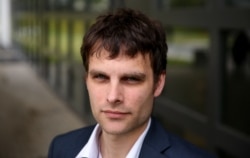The awards season is upon us -- at least when it comes to prizes of strong political resonance.
All eyes will be on the Norwegian Nobel Committee when it announces the winner of the Nobel Peace Prize on October 10, especially as some countries have nominated US President Donald Trump.
But there is another prestigious honor that will be announced this fall: the annual Sakharov Prize for Freedom of Thought, the European Union's top human rights award.
While the American president has not been proposed for this 50,000 euro ($59,000) prize, many individuals and organizations from RFE/RL's coverage area were nominated, including Serbian student protesters, the Budapest Pride event, Polish-Belarusian journalist Andrzej Poczobut, and Georgian journalist Mzia Amaglobeli together with her country's pro-democracy movement.
They are up against other nominees such as Palestinian journalists and development workers, and, rather controversially, the recently assassinated American conservative political activist Charlie Kirk.
Political Jockeying
The award is run entirely by the European Parliament.
Created in 1988 in honor of the Russian scientist and dissident Andrei Sakharov, it has become one of the chamber's key public relations tools, with repressive regimes often lashing out at European lawmakers over nominations and winners.
It is also not uncommon for Sakharov Prize winners to go on to win the Nobel Peace Prize down the line, with examples including the Pakistani education activist Malala Yousafzai and the Congolese humanitarian Denis Mukwege.
The nominations -- which this year will be officially presented on September 23 at a joint session of the European Parliament's foreign affairs, development and human rights committees -- are usually put forward by the parliament's various political groups or at least 40 its members (MEPs).
The deadline for these nominations passed last week, and the groups have already publicly communicated who their respective nominees are.
The September 23 event is essentially an occasion to make the public case for your nominee because the political jockeying about which three will be shortlisted -- and who the eventual winner will be -- starts now.
Numbers Game
Size also matters. The shortlisting happens on October 16 this year, when members of the European Parliament's foreign affairs and development committees will hold a secret vote on their favorite.
It's strictly one member, one vote, and the three candidates who get the most support are the ones shortlisted.
Since the ballot is secret, no one officially communicates the final result, but the media tend to get hold of the numbers and they tend to be tight. Normally less than a handful of ballots determine the final trio.
Party discipline is key, and MEPs are often pressured to vote for the candidate put forward by their political group. With membership of the two committees determined by the size of the political groups, it very much becomes a numbers game.
Things are complicated further by nominees who aren't backed by a political group but rather by a collection of MEPs across the political spectrum.
This makes everything rather unpredictable, and that unpredictability often prevails all the way up until the final decision, which will be taken on October 22.
This is not made by any committee, however, but rather by the European Parliament's Conference of Presidents, which consists of the president of the chamber, Roberta Metsola, and the leaders of the eight political groups. The vote here is secret as well and deliberations can be long, but again, the bigger the political group, the weightier its vote.
So who will be shortlisted and who will be the eventual winner?
Logic suggests it will be Andrzej Poczobut given he is backed by the largest group in the chamber, the center-right European People's Party (EPP).
"They tend to get their way," as one European Parliament official recently put it to RFE/RL when discussing the prize.
It helps that Poczobut has also been nominated by the European Conservatives and Reformists (ECR), the fourth-largest group.
These two teamed up in 2024 to successfully promote Venezuelan opposition politicians Maria Corina Machado and Edmundo Gonzalez Urrutia for the Sakharov award.
Officials from the EPP and the ECR told RFE/RL they believe a win for Poczobut could help him get released from prison, especially since Aleksandr Lukashenko's authoritarian regime has started to free political prisoners. The releases follow a sweeping crackdown on civil society and opposition activity after Belarus's disputed 2020 presidential election, which was widely condemned as rigged.
But it is far from certain that Poczobut will get the nod.
The second-biggest group, the center-left S&D, has put forward journalists and humanitarian aid workers in conflict zones represented by the Palestinian Press Association, the Palestine Red Crescent Society, and the United Nations Relief and Works Agency.
The more left-wing and smaller Left group nominated a number of Palestinian journalists.
If these two consolidated their respective nominations and chose a Palestinian individual or organization, they could potentially have the numbers to prevail.
Long Shots
The numbers probably won't favor Budapest Pride, put forward by the Greens, who aren't much of a political force these days, nor the Serbian student protesters backed by the liberal Renew group, which is only the fifth-largest grouping.
Charlie Kirk is also a nonstarter as he is favored by the smallest faction, the far-right Europe of Sovereign Nations, which no other political family wants to cooperate with.
One potential dark horse and a possible compromise choice is the jailed Georgian journalist Mzia Amaglobeli. She is backed by 61 MEPs from various political parties. Normally, that might not be enough to even get her shortlisted. But almost all political groups -- including both the EPP and S&D -- considered nominating her before opting for others.
Amaglobeli is widely recognized and admired in the chamber. A Georgian has never won the prize before, and the house is keen to send a message to Tbilisi.
It's a long shot, though, as political groups tend to be disciplined. This year, the race is more open than ever.














